NOTE IMDb
7,6/10
5,6 k
MA NOTE
Ajouter une intrigue dans votre langueWhen an aging activist is arrested, the lives of the accused, the lawyers, and the judge intertwine to reveal bigotry that underscores the judicial system.When an aging activist is arrested, the lives of the accused, the lawyers, and the judge intertwine to reveal bigotry that underscores the judicial system.When an aging activist is arrested, the lives of the accused, the lawyers, and the judge intertwine to reveal bigotry that underscores the judicial system.
- Réalisation
- Scénario
- Casting principal
- Récompenses
- 21 victoires et 10 nominations au total
Sukhdas Suryawanshi
- Sukhdev (court staff)
- (as Sukhdas Suryawamshi)
Avis à la une
I heard of this movie through various critics and decided to catch it at nearby cinema hall. The experience was a total satisfaction.
The movie is a satire on Indian judicial system and has been dealt with so beautifully that it neither delivers the message on the face nor it becomes offensive at any point. It is an absolute gem. Though the movie is in Marathi language the subtitles attached to it help an average moviegoer.
The movie does not have too much of moving camera shots and in most of the scenes, director just places the camera at one location and the events unfold in a still frame. This is such a wonderful piece of art that despite no known faces and no fancy camera work the movie works. Not just works but its bang on target.
I would strongly recommend this movie to any sane and rational movie buff for quite a few days to come.
The movie is a satire on Indian judicial system and has been dealt with so beautifully that it neither delivers the message on the face nor it becomes offensive at any point. It is an absolute gem. Though the movie is in Marathi language the subtitles attached to it help an average moviegoer.
The movie does not have too much of moving camera shots and in most of the scenes, director just places the camera at one location and the events unfold in a still frame. This is such a wonderful piece of art that despite no known faces and no fancy camera work the movie works. Not just works but its bang on target.
I would strongly recommend this movie to any sane and rational movie buff for quite a few days to come.
Chaitanya Tamhane's Court approaches many fascinating and bitingly topical subjects for a constantly changing India. When those to the west think of India, we often imagine the hustle and bustle depicted in Slumdog Millionaire coupled with the energy and glittery elegance of Bollywood movies. Court is a slower burn with incredible wide cinematography that captures a disquieting stillness. It's almost like a political thriller where no-one can be trusted, but it's not a film that relies on tension or conclusions. It studies the westernisation of Indian culture through its network of characters, darting between the folk singer Sharmila Pawar and his 'Americanised' defence lawyer Vinay Voya, but without peeling back their layers. It's not interested in the characters as people but what they represent in the situation, wherein Pawar is being tried for inciting a man to suicide through his songs.
Instead, it contrasts the old with the new, with Indian traditions and the updates of the youths, aesthetically and with their behaviour. The courtroom drama prods at this aspect with old laws being questioned for being outdated and how they should be reconsidered. It seems a lack of compromise is also part of tradition and is something that contemporary Indians wants to implement. The film also studies the effect of art, questioning whether folk music can really change a government and if it does influence bad things incidentally, can it be held accountable? The power of poetry is a strange thing in a world drenched in culture. What counts as a performance when art is so fluid? Where do we draw the line between coincidence and crime? Court is a very dry but very thought-provoking and highly intelligent film that raises important questions about the world we live in, albeit it could've been improved by a bit more character work and a concise ending.
8/10
Read more @ The Awards Circuit (http://www.awardscircuit.com/)
Instead, it contrasts the old with the new, with Indian traditions and the updates of the youths, aesthetically and with their behaviour. The courtroom drama prods at this aspect with old laws being questioned for being outdated and how they should be reconsidered. It seems a lack of compromise is also part of tradition and is something that contemporary Indians wants to implement. The film also studies the effect of art, questioning whether folk music can really change a government and if it does influence bad things incidentally, can it be held accountable? The power of poetry is a strange thing in a world drenched in culture. What counts as a performance when art is so fluid? Where do we draw the line between coincidence and crime? Court is a very dry but very thought-provoking and highly intelligent film that raises important questions about the world we live in, albeit it could've been improved by a bit more character work and a concise ending.
8/10
Read more @ The Awards Circuit (http://www.awardscircuit.com/)
Chaitanya Tamhane's directorial debut, Court, is a multilingual, award- winning film on the "quiet violence" of the judicial system and how the State uses it to suppress political activists. Financed by the Hubert- Bals Fund and private equity, it opened to rave reviews and won Best Director and Best Film in the International Competition section of the 16th Mumbai Film Festival. It also premiered at the Venice Film Festival earlier in the year, where it won the Lion of the Future Award for the best first feature. Court successfully invokes the mood of a trial based on patently ridiculous charges, conducted with no intent other than disciplining and harassment of an activist. A phenomenon that is all too common in India. The theme is very timely given the increasingly intolerant nature of the Indian State and the large number of political prisoners languishing in jail all across the country.
The film follows the trial of Narayan Kamble (Vira Sathidar), a Dalit political activist and lokshahir (people's poet) who is arrested on stage during a performance in Bombay on charges of "abetment of suicide." The police claim that Kamble has penned and performed "incendiary" lyrics calling on Dalits to "drown themselves in sewage" provoking a municipal sanitation worker to actually take his own life by drowning in the very sewer it is his duty to clean. The absurdity of the charge is matched by the (mock?) seriousness with which it is pursued but the police and the officials of the Sessions court. While the politics of false charges and suppression of activists via legal means is an important theme in the film, Tamhane also uses the context of the trial to explore the everyday lives of the principal actors in the courtroom; especially the lawyers for defense (producer Vivek Gomber) and prosecution (played by Geetanjali Kulkarni), and the judge (Pradeep Joshi). What emerges is how extraordinary injustice is embedded in quotidian affairs. The prosecution lawyer argues against bail, ensures that an honest man of advanced years rots in police custody for no reason at all and then goes home to cook dinner and watch TV with her family.
The ponderous legal system is certainly the main protagonist, as is evident in the name of the film. And as a useful counterpoint to the brilliant and satirical Mohan Joshi Hazir Ho, Court forces us confront the fact that the byzantine alleyways of justice and the proverbial tarikh pe tarikh, are not merely the unintended result of an uncaring and bureaucratic system but rather used deliberately by the State to remove its more inconvenient citizens for some time, say three or four years. At which time it is the headache of the next set of rulers.
See the full review at: http://sanhati.com/excerpted/11761/
The film follows the trial of Narayan Kamble (Vira Sathidar), a Dalit political activist and lokshahir (people's poet) who is arrested on stage during a performance in Bombay on charges of "abetment of suicide." The police claim that Kamble has penned and performed "incendiary" lyrics calling on Dalits to "drown themselves in sewage" provoking a municipal sanitation worker to actually take his own life by drowning in the very sewer it is his duty to clean. The absurdity of the charge is matched by the (mock?) seriousness with which it is pursued but the police and the officials of the Sessions court. While the politics of false charges and suppression of activists via legal means is an important theme in the film, Tamhane also uses the context of the trial to explore the everyday lives of the principal actors in the courtroom; especially the lawyers for defense (producer Vivek Gomber) and prosecution (played by Geetanjali Kulkarni), and the judge (Pradeep Joshi). What emerges is how extraordinary injustice is embedded in quotidian affairs. The prosecution lawyer argues against bail, ensures that an honest man of advanced years rots in police custody for no reason at all and then goes home to cook dinner and watch TV with her family.
The ponderous legal system is certainly the main protagonist, as is evident in the name of the film. And as a useful counterpoint to the brilliant and satirical Mohan Joshi Hazir Ho, Court forces us confront the fact that the byzantine alleyways of justice and the proverbial tarikh pe tarikh, are not merely the unintended result of an uncaring and bureaucratic system but rather used deliberately by the State to remove its more inconvenient citizens for some time, say three or four years. At which time it is the headache of the next set of rulers.
See the full review at: http://sanhati.com/excerpted/11761/
Saw this at the Rotterdam film festival 2015 (IFFR), where it was part of the Bright Future section (and indeed, it deservedly belonged in that section). In short: Very well done, in all respects. We get an inside view in the Indian legal system and also in normal life there, the latter while we follow opposing council and see how they live outside the court. And in the final scene, when the case is all over, we also follow the judge on a family trip. This final scene is somewhat detached from the core story, but its purpose becomes clear when seeing the judge on a holiday trip in family circles. It seemed a loose end, but fits nicely in the setup, after all.
The Indian legal system is portrayed very well and (as far as I can see) objectively, not leaving a bad impression behind. Prosecution and defense council act believably and competently, and each gets their say. The judge on his side goes strictly by the book. That being his role in the proceedings, I have no problem with him either. The police force is portrayed less positive, if not merely incompetent, showing tunnel vision when locating suspects and witnesses. Interestingly, typically Indian I assume, we see laws quoted from the colonial age. This is remarkable but apparently a fact of contemporary Indian life. And, as judge agrees with prosecution, it IS current law hence applies in this case. In the final Q&A, the director confirms that many laws are outdated, requiring interpretation to establish what they really mean nowadays.
I noted two loose facts from the Q&A. Firstly, the slum area we see when one of the witnesses is brought back to her family, looks true to reality. Nearly demolished places like that coexist in the same city. Secondly, as far as the actors are concerned, we learn that 90% was non-professional. For that reason, Narayan's songs are playbacked.
To conclude: Some people in Western countries may find nearly two hours running time overly long, but it did not feel that way. I think that is caused by mixing court scenes with family scenes outside the court room. As such, we see the formal proceedings indoors next to what happens outdoors in personal lives of councils and judge. Intermixing these two worlds works very well. Indeed, the story seems to drag some of the time, just like the actual court case does, but it did not hinder me at all, as there were ample developments, and last-but-not-least interesting local folklore that we would never had the chance to see if not through this movie.
The Indian legal system is portrayed very well and (as far as I can see) objectively, not leaving a bad impression behind. Prosecution and defense council act believably and competently, and each gets their say. The judge on his side goes strictly by the book. That being his role in the proceedings, I have no problem with him either. The police force is portrayed less positive, if not merely incompetent, showing tunnel vision when locating suspects and witnesses. Interestingly, typically Indian I assume, we see laws quoted from the colonial age. This is remarkable but apparently a fact of contemporary Indian life. And, as judge agrees with prosecution, it IS current law hence applies in this case. In the final Q&A, the director confirms that many laws are outdated, requiring interpretation to establish what they really mean nowadays.
I noted two loose facts from the Q&A. Firstly, the slum area we see when one of the witnesses is brought back to her family, looks true to reality. Nearly demolished places like that coexist in the same city. Secondly, as far as the actors are concerned, we learn that 90% was non-professional. For that reason, Narayan's songs are playbacked.
To conclude: Some people in Western countries may find nearly two hours running time overly long, but it did not feel that way. I think that is caused by mixing court scenes with family scenes outside the court room. As such, we see the formal proceedings indoors next to what happens outdoors in personal lives of councils and judge. Intermixing these two worlds works very well. Indeed, the story seems to drag some of the time, just like the actual court case does, but it did not hinder me at all, as there were ample developments, and last-but-not-least interesting local folklore that we would never had the chance to see if not through this movie.
COURT MOVIE REVIEW- Just watched Court movie and couldn't stop myself by clapping in the end of the movie.read so many reviews and film has already got the national award so my expectations were sky high.i was expecting a masterpiece.and i am very proud to say that Marathi cinema has given us another masterpiece.an eye opener movie with complete realistic screenplay.film has a simple story,a folk singer get arrested by police and then whatever happens in a court is all about the script.no melodrama,no action,no vulgarity,no turning points only a simple story gets going and leave us with an eye opening message.film shows us the atmosphere inside the court and also the corrupt outside world.a brilliant message of how bad is the mentality of well educated Judge we have in our system.a common man has much knowledge,mind n sense than educated people.a true face of lawyers,police and some poverty caste peoples of our society.don't know from where director Chaitnya got idea to make a movie on this topic.but i must say he has done a fabulous job here.a natural and realistic screenplay takes the quality of movie to the high level.all actors are almost new faces and freshers,who does not have any big film or experience on their names but here they all have done a brilliant job.completely natural acting by them is just out of the world.film has no songs and doesn't even need it.camera work is damn awesome.story,screenplay are completely natural and realistic.i want to mention one more thing here,Dialouges..! The most loved part of the film for me.that conversation of lawyers is just wow.with the ease they delivers it is impossible for any other actor.my request to all who are reading this review,go and watch this masterpiece but only if you know and understand the meaning of class and quality.strongly recommended to classes.50% dialogs are in English so masses you please don't watch it,you keep watching that masala and entertaining stuff..no wonder why this movie got ''Best Indian Film'' award in national awards,you guys deserves it..final words,kudos and salute to the team of ''Court'' for giving us this masterpiece...
Le saviez-vous
- AnecdotesSome cast members were untrained, non-professional actors. In the case of the woman who plays the deceased's widow, it's eerie how unaffected the scene is before you realize that it's reality. (The woman is widowed in real life. Her husband was a manhole worker.)
- Bandes originalesDhanya Dhanya Tumhi Sarkar
Written and performed by Sambhaji Bhagat
Meilleurs choix
Connectez-vous pour évaluer et suivre la liste de favoris afin de recevoir des recommandations personnalisées
- How long is Court?Alimenté par Alexa
Détails
Box-office
- Montant brut aux États-Unis et au Canada
- 22 898 $US
- Week-end de sortie aux États-Unis et au Canada
- 4 806 $US
- 19 juil. 2015
- Montant brut mondial
- 57 416 $US
Contribuer à cette page
Suggérer une modification ou ajouter du contenu manquant







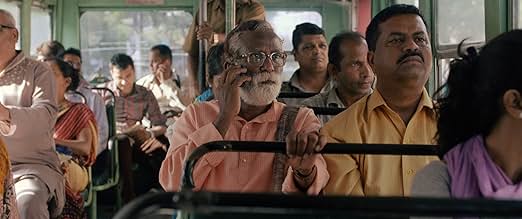
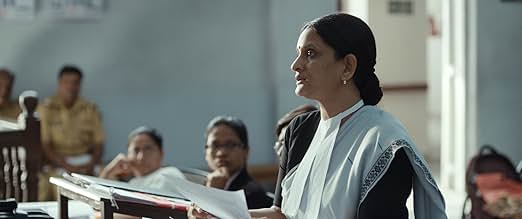
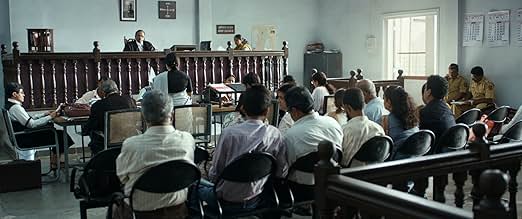
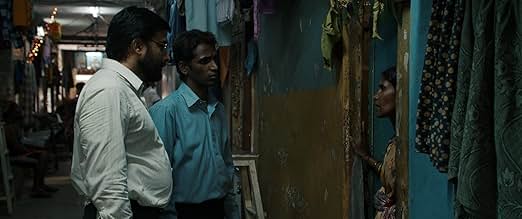
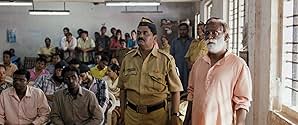












![Peepli [Live]](https://m.media-amazon.com/images/M/MV5BNDc1YTEwYmUtYTIxMC00Mjg4LWJmODctNGNiYjNjMTA3NjY5XkEyXkFqcGc@._V1_QL75_UY207_CR2)


